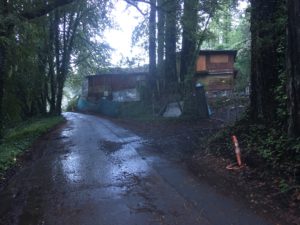I was raised strict atheist. We had a Christmas tree and gave gifts. We admired seasonal revelry in a Currier-and-Ives kind of way, without taking much part in it.
In adulthood, I learned to appreciate the blend of ritual and melancholy captured so well in the original lyrics to “Have Yourself a Merry Little Christmas.” I can’t say I’ve ever looked forward to the Christmas season, but I have sought, each year, to find some transformative moment in it. I’ve found that moment, sometimes, while walking alone on a crowded shopping street, or hanging an ornament on the tree, or just sitting in a warm armchair and listening to medieval carols.
At 50, I fathered a child. My new relatives are assimilated Jews. I’ve done seven Christmas Eves their way; I’ve felt more and more each year that something was missing.
So this year, I started to explore various meanings of Christmas.
I should say: By this time in life, I’m a lapsed atheist. I still discount the truth of religious doctrine, but I don’t discount the value of faith.
My exploration was helped when I read this piece by Bill Muehlenburg, who seems to take his Bible straight up.
He says Christmas is about incarnation and redemption. Now here are ideas I can wrestle with. I mean, Christmas is also about finding light in the darkest hours, and it is about fully experiencing joy, and while it is not a given to achieve either of those things, I don’t question their value, or the value of trying.
But incarnation? The existence of God in human form, who walks (or walked) among us, like an ordinary man? I need to think harder about that.
As an evolution of belief, I like it. It’s way better than believing in a God who doesn’t walk among us. I can squint and appreciate Jesus in an immanentist way, as the experience of the divine in the mundane. We all could use more of that, I think, in a time when people tend to act as if their own fate, and the fate of the world, are things to be trifled with. We could have a little more awe, and conduct ourselves more as embodiments of spirit, and be less reactive to what gets served up daily in the earthly vale.
The idea of redemption had me digging a little harder. Even if we are non-believers, we can be attracted by concept of God’s unconditional love. Again, as a belief, it’s way better than believing in an Old Testament God, who is the kind of prick who smites you if he doesn’t like your looks (and even if you’re his biggest fan, invites you to kill your kid to demonstrate that you really believe).
The unconditional love thing looks easier than it really is, because to accept and fully experience unconditional love, you also have to accept yourself, just as you are, you sinner you. That’s hard, but once you achieve that self-acceptance, your relationship to God has to change, and I think that change must be profoundly liberating.
Which brings us back to the problem of belief. The great good deal, according to Christian doctrine, is that you get that unconditional love, along with everlasting life—and all you have to do is believe.
I don’t believe, and I look askance at the idea that one believes what one wills to believe. That idea is all too common, and you and I would do well to reject it. Like I said, I don’t discount the value of faith, but just up and deciding to have faith, to get the benefits it provides, strikes me as cheap and easy, and cheap and easy is not what I want at Christmas.
So here’s what Christmas means to me, at least for now: A celebration of the divine in everyday life. An awe of what it means to be human, and of the gifts and responsibilities that come with that. A time to stretch myself to accept myself and to accept others, and to revel in the changes that practice brings. And a little melancholy as I look at the passage of another year.
 About an hour into the 6-hour drive home, feeling hungry, I stopped at an In-n-Out Burger in Santa Maria. Santa Maria is an ag-and-oil town, sprawling and charmless.
About an hour into the 6-hour drive home, feeling hungry, I stopped at an In-n-Out Burger in Santa Maria. Santa Maria is an ag-and-oil town, sprawling and charmless.
 I was also hoping for some woodsy peace, but I didn’t get that either. There was a profusion of “No Trespassing” and “Keep Out” signs everywhere, and those always put me on edge. Like I’m feeling these folks don’t want outsiders walking up their road.
I was also hoping for some woodsy peace, but I didn’t get that either. There was a profusion of “No Trespassing” and “Keep Out” signs everywhere, and those always put me on edge. Like I’m feeling these folks don’t want outsiders walking up their road.